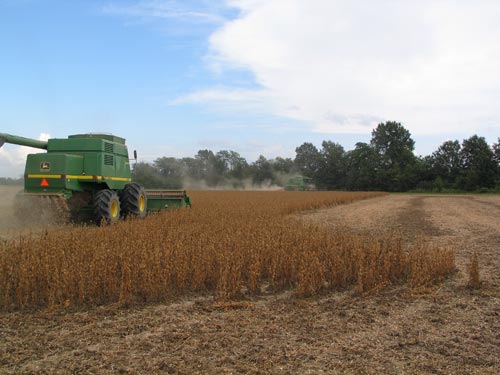November 21, 2011

Nature threw one more monkey wrench at soybean farmers working to harvest this year's flood-, drought- and insect-plagued crop.
“This fall soybean harvest in some fields was complicated by immature green plants scattered across the field while most of the plants were ready to cut,” said John Rupe, professor-plant pathology for the University of Arkansas Division of Agriculture in mid-November. “These green plants slowed harvest because they were difficult to cut, and some growers may have been docked at the elevator because of green seed.”
The crop progress report issued Nov. 14 by the National Agricultural Statistics Service showed the soybean harvest at 93 percent complete. A series of widespread and locally heavy rain events have slowed harvest in some parts of Arkansas.
Rupe said the green plants exhibited differing levels of maturity.
“Some had green pods with normally developing seed, while others had tufts of small immature pods and a few pods with a single large seed and some plants had a mixture of these pod types. This problem occurred across the state on a wide number of cultivars and soil types but was worse in June-planted fields.”
In most fields, less than 1 percent of the plants were affected, but the problem looked much worse because the green plants were so visible. “Yield losses in these fields were probably negligible, however in some fields or in parts of fields, a much higher proportion of plants were affected, likely lowering yields.”
Pinpointing a cause is difficult, with green beans attributable to several factors including heat, diseases or stinkbugs.
“The high temperatures at flowering this year may have led to uneven pollination and flower abortion, forcing the plants to re-flower, delaying pod set and maturity.”
Viruses or phytoplasmas – disease causing agents related to bacteria -- can keep soybean plants from maturing. Rupe said the Division of Agriculture was testing plants to see if either pathogen was involved delaying maturity.
“Soybeans that fail to mature occur every year somewhere in Arkansas, but usually not in the same field the following year. This has made determining the cause or causes of this problem difficult but also means that just because the problem occurred this year doesn’t mean it will be a problem next year.
“At this point there are no recommended control measures for delayed maturity but encouraging adequate pollination by preventing plant stress at flowering and controlling stink bugs are good crop management practices and may be helpful.”
To learn more about soybean production, contact your county Extension office or visit www.uaex.edu and www.arkansascrops.com.
You May Also Like




